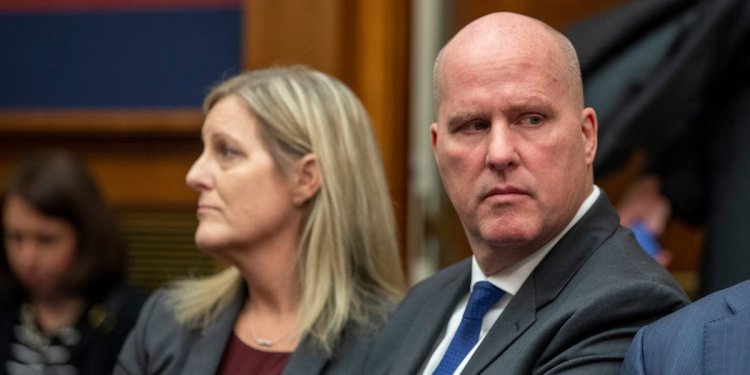Boeing whistleblower says he urged Alaska Airlines to ground the 737 Max before blowout — and calls regulators 'horribly asleep at the wheel'
Ed Pierson told Business Insider that Boeing's leaders were "crushing the company" and investors should demand change.

Tasos Katopodis/Getty Images
- Ex-Boeing senior manager Ed Pierson criticized the company, airlines, and regulators over 737 Max issues.
- He told BI that Alaska Airlines "ignored" his warnings to ground its jets back in April 2023.
- Pierson called on investors to demand new management because execs are "crushing the company."
A Boeing whistleblower slammed the manufacturer, airlines, and regulators for their response to problems with the 737 Max, in a wide-ranging interview with Business Insider.
Ed Pierson is a former Boeing senior manager who testified before Congress in 2019 amid the fallout over the two Max 8 crashes that killed 346 people.
Boeing's newest narrowbody jet is back under scrutiny after a Max 9 operated by Alaska Airlines lost a door plug in midair on January 5. All 171 such jets with a door plug were subsequently grounded by the Federal Aviation Administration for more than 40 days.
Pierson told BI that he tried to warn Alaska Airlines months before the incident, having examined its service difficulty reports — which can cover a wide range of defects and malfunctions.
He said he wrote to Alaska's CEO Ben Minicucci in April 2023: "There's lots of red flags that are coming up and saying that your planes could be not safe. And I recommended he ground them."
"We sent a certified return receipt letter, and they just ignored it," Pierson added.
Alaska Airlines did not respond to a request for comment from BI on Pierson's letter.
Several airline bosses, including Minicucci, have criticized Boeing since the blowout. But Pierson said airlines "are a huge part of the problem."
That's because airline CEOS also said they have confidence in Boeing executives. Pierson noted that they still have to do business with the manufacturer — Airbus doesn't have the capacity to build everybody's planes.
'Who the hell is running this ship?'
Pierson said his work included overseeing a team that responded to problems with Boeing's quality-control processes. He retired in 2018, two months before the first Max 8 crash.
He believes all 737 Max jets should be grounded due to production problems.
In its preliminary report about Alaska Airlines Flight 1282, the National Transportation Safety Board said four critical bolts designed to secure the door plug weren't installed when the plane left Boeing's factory.
"That's symptomatic of a much bigger problem, which is dangerous manufacturing processes all around," Pierson told BI.
He pointed to a safety-exemption request that Boeing submitted last December, before withdrawing it after the blowout.
The Federal Aviation Administration said the Max jets' engine anti-ice system could cause the engine to overheat — and potentially result in debris breaking off and hitting the plane, resulting in a loss of control. Boeing said in its request that such a scenario is "extremely improbable."
Pierson said that Dave Calhoun, Boeing's CEO, is "pushing the system to the breaking point" by having planes "rushed through the factory" and overworking employees.
Following the blowout, the FAA stopped Boeing expanding production of the 737 Max until it was satisfied with its quality control. Boeing is producing 38 such jets a month, down from 59 before the Max 8 grounding in 2019, per CNN.
"Investors should be outraged at all these failures that are occurring, and that are just risking this company's future," Pierson said. JASON REDMOND/AFP via Getty Images
"I believe in the people of the Boeing Company. What I don't believe in is their senior leadership," Pierson told BI. "I think their senior leadership is horrible."
He said executives are "completely out of touch" with what's happening in the factory — noting its distance from the headquarters. 737 production is based near Seattle, while the company is headquartered in Arlington, Virginia.
Pierson also pointed to the Boeing CEO commuting via private jet from his New Hampshire home. The Wall Street Journal previously reported this, adding that employees mocked Calhoun with souvenir mugs.
Pierson said: "You add all this up, and you're like: 'Who the hell is running this ship?'"
"And that's why we've been advocating that the leadership at the Boeing Company needs to get out," he added. "The shareholders need to get the board out, and get the C-suite out, because they're crushing the company."
The Federal Aviation Administration released the findings of its resulting investigation into Boeing on Monday. It said there was "a disconnect between Boeing's senior management and other members of the organization on safety culture."
Boeing declined to comment on Pierson's remarks.
What is the FAA doing?
"The FAA has been horribly asleep at the wheel here in their oversight responsibilities," Pierson said. "It's much safer to help find these problems in the factory than wait until they get out and they escape the factory. And then you have potentially tragic situations."
A representative said: "The FAA made significant improvements to its delegation and aircraft certification processes in recent years and took immediate action following the January 5 Alaska Airlines door plug incident to address concerns about the quality of aircraft that Boeing and its suppliers produce."
The FAA has sent "approximately two dozen" safety inspectors to review production lines at Boeing and its supplier Spirit AeroSystems.
That includes "all elements and stations" of the production systems; how Boeing transfers suppliers' unfinished work to its own production lines; and employee training and qualifications.
However, Pierson said the number of inspectors is "completely insufficient for the task."
The FAA pointed to several other actions including an investigation into whether Boeing failed to maintain its quality system in accordance with regulations, and "increased data monitoring to identify emerging risk."
Pierson believes not enough is being done to improve Boeing: "We're getting closer and closer to another major preventable catastrophe."
What's Your Reaction?




















